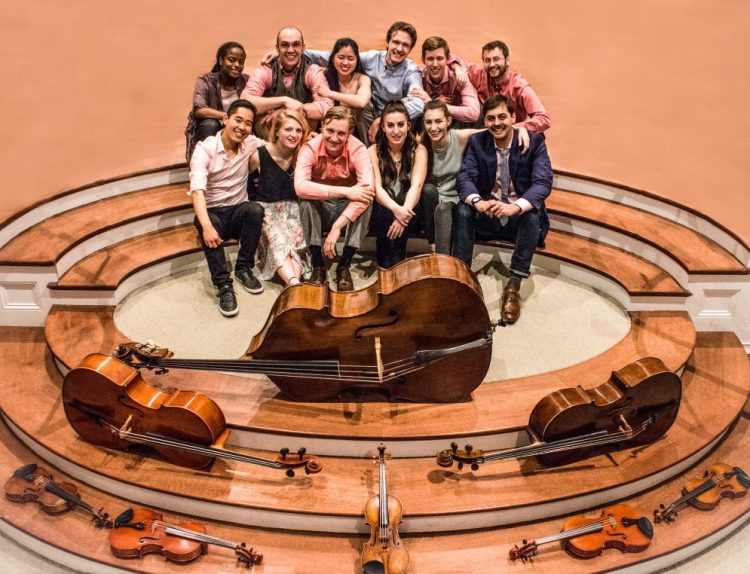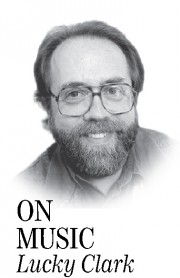Last week, I featured a Farmington native, Sarah E. Geller, who plays violin and teaches in New York City. This week I have another young lady who also is a violinist and teacher, Maya French. She is part of the 12-piece ensemble known as Palaver Strings, which will perform from 8 to 10 a.m. Friday, April 21, at the Unity College Center for the Performing Arts.
To learn more about French and her organization, I called her when she was in Alaska, and as I was doing so, I happened to notice the cell number I was given had the Maine area code, 207.
French: Yeah, I’m from Belfast.
Q: Does that mean that Palaver Strings is Maine-based as well?
French: No, not yet. We started in Boston, where most of us got our music degrees. Three of us are from Maine. One’s from Orono, I’m from Belfast and one’s from Cushing, so we grew up playing together. But for now, we operate in Boston and do performances all over the New England area. We’re planning to open an after-school program in Portland in a few years.
Q: Will this be your group’s first time in the UCCPA?
French: Yes. In other years we’ve played in Belfast and we’re playing at the Collins Center next April, and they we’ve played in Portland.
Q: I think you will enjoy the venue in Unity.
French: Yeah, I’ve been there and so I’m really excited to play there.
Q: Are you in Alaska now?
French: Yeah.
Q: What are you doing up so early?! It’s 10:15 in the morning, which is 6:15 a.m. your time.
French: I’m here for a week doing research. I teach at a charter school in Boston and I’m here in Juneau observing a school program that we hope to model one of our schools in Portland after. So, I’m here on a grant. I’ve got to go to school soon, so that’s why I’m up now.
Q: So back to the reason for our conversation. What will your program at Unity be like?
French: Well, we’re actually doing a double bill with the Gawler Sisters. They’re from mid-coast Maine and are a folk trio that writes original songs and plays a lot of traditional music. They’ll have a 20-minute set, then we’re playing Dvorak’s “Serenade in E” as a group and an arrangement of a very early chant piece by John Dowland and “Appalachia Waltz” by Mark O’Connor, a trio will perform that, and we’ll do a set of traditional New England fiddle music with the Gawlers again, so there will be 15 of us, including them. Oh, and we’ll also be playing an arrangement of Bartok’s “Romanian Folk Dances,” too.
Q: What kind of repertoire does Palaver Strings have?
French: We play a lot of chamber music. There are 12 of us, all strings, and we often play expanded string sextets, so we double them. Some of our members do arranging. We also do string orchestra repertoire and then do different styles. We do some jazz and fiddle improvisation; many different kinds of things, but we’re always expanding our repertoire, of course.
Q: Where does the name of your group come from?
French. It comes from the West African term for “palaver hut.” If you look at our website you’ll see our logo is kind of like a hut. It’s a place where people go when they have conflicts. They go into this hut and meet consensus and then come out. Our mission is to provide music for diverse audiences through performances and workshops in and outside of concert halls, so we perform free concerts or work with community organizations to give different types of workshops on non-verbal communication or movement through music, and work with many different artists and collaborators to do so. We are also completely democratic as an ensemble. There are 12 of us and we’re all artistic directors who all make artistic directions for the group — making decisions together to find consensus.
Q: Is there anything you’d like to pass on to the readers of this article seeing this is your group’s debut performance in this area?
French: I think one of the most important things we’re feeling right now as a group, just as young artists and musicians and creators, is that it’s so important for communities to focus on culture and the arts as a means to learn more about each other and communicate. Right now we feel that’s really important. So our goals as an ensemble are to be pretty evenly balanced between being a performing ensemble and an educating organization. We want to perform and educate evenly and make sure we provide space for people to communicate in different ages, but definitely focus towards younger people.
Lucky Clark has spent more than 45 years writing about good music and the people who make it. He can be reached at luckyc@myfairpoint.net if you have any questions, comments or suggestions.
Send questions/comments to the editors.




Success. Please wait for the page to reload. If the page does not reload within 5 seconds, please refresh the page.
Enter your email and password to access comments.
Hi, to comment on stories you must . This profile is in addition to your subscription and website login.
Already have a commenting profile? .
Invalid username/password.
Please check your email to confirm and complete your registration.
Only subscribers are eligible to post comments. Please subscribe or login first for digital access. Here’s why.
Use the form below to reset your password. When you've submitted your account email, we will send an email with a reset code.